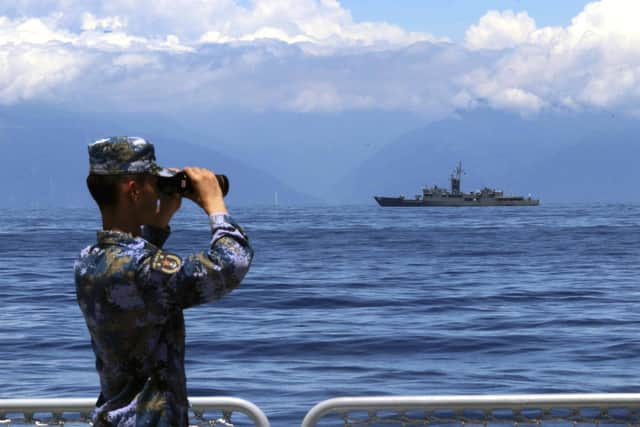China reaffirms threat of military force to take control of Taiwan
A statement issued on Wednesday by the Cabinet’s Taiwan Affairs Office and its news department came after almost a week of missile firings and incursions into Taiwanese waters and airspace by Chinese warships and air force planes.
The actions have disrupted flights and shipping in a region crucial to global supply chains, prompting strong condemnation from the US, Japan and others.
Advertisement
Hide AdAdvertisement
Hide AdAn English-language version of the Chinese statement said Beijing would “work with the greatest sincerity and exert our utmost efforts to achieve peaceful reunification”.


“But we will not renounce the use of force, and we reserve the option of taking all necessary measures. This is to guard against external interference and all separatist activities,” the statement said.
“We will always be ready to respond with the use of force or other necessary means to interference by external forces or radical action by separatist elements. Our ultimate goal is to ensure the prospects of China’s peaceful reunification and advance this process.”
China says the threatening moves were prompted by a visit to Taiwan last week by US House Speaker Nancy Pelosi, but Taiwan says such visits are routine and that China used that merely as a pretext to up its threats.
In an additional response to Ms Pelosi’s visit, China said it was cutting off dialogue on issues from maritime security to climate change with the US, Taiwan’s chief military and political backer.
Taiwan’s foreign minister Joseph Wu warned on Tuesday that the Chinese military drills reflect ambitions to control large swaths of the western Pacific, while Taipei conducted its own exercises to underscore its readiness to defend itself.
The exercises show China’s “geostrategic ambition beyond Taiwan”, which Beijing claims as its own territory, Mr Wu said.
“China has no right to interfere in or alter” Taiwan’s democracy or its interactions with other nations.
Advertisement
Hide AdAdvertisement
Hide AdTaiwan split with the mainland amid civil war in 1949 and the island’s 23 million people overwhelmingly oppose political unification with China, while preferring to maintain close economic links and the status quo of de-facto independence.
The US, Taipei’s main backer, has also shown itself to be willing to face down Beijing’s threats.
Washington has no formal diplomatic ties with Taiwan in deference to Beijing, but is legally bound to ensure the island can defend itself and to treat all threats against it as matters of grave concern.
That leaves open the question of whether Washington would dispatch forces if China attacked Taiwan.
US President Joe Biden has said repeatedly the US is bound to do so — but staff members have quickly walked back those comments.
Beyond the geopolitical risks, an extended crisis in the Taiwan Strait, a significant thoroughfare for global trade, could have major implications for international supply chains at a time when the world is already facing disruptions and uncertainty in the wake of the coronavirus pandemic and the war in Ukraine.
In particular, Taiwan is a crucial provider of computer chips for the global economy, including China’s high-tech sectors.
In response to the drills, Taiwan has put its forces on alert, but has so far refrained from taking active counter measures.
